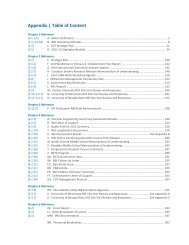The case for outsourcing chronic care management
1NFcfvK
1NFcfvK
You also want an ePaper? Increase the reach of your titles
YUMPU automatically turns print PDFs into web optimized ePapers that Google loves.
growing population of <strong>chronic</strong>ally ill Medi<strong>care</strong> patients. Such patients<br />
can be the most expensive participants in the health<strong>care</strong> system, since<br />
they tend to rely more heavily on ERs and become hospitalized more<br />
often. <strong>The</strong> CDC has estimated that about 85% of Federal health<strong>care</strong><br />
dollars are allocated to the treatment of <strong>chronic</strong> conditions. For just<br />
the top seven most prevalent <strong>chronic</strong> diseases, the estimated cost of<br />
treatment in 2013 was $1.3 trillion.<br />
Care <strong>management</strong> <strong>for</strong> these <strong>chronic</strong>ally ill patients has been proven to<br />
improve outcomes and reduce costs. Care plan development, medication<br />
reconciliation, coordination of <strong>care</strong> with other providers (such as specialists),<br />
arrangement <strong>for</strong> social services, remote patient monitoring and<br />
other services all have have benefits to patients and help to contain<br />
costs. And yet, physicians were allowed by CMS to bill only <strong>for</strong> the time<br />
they spent with patients during office visits.<br />
That changed in January 2015 when CMS introduced CPT code 99490<br />
to encourage wider CCM availability to patients. Health<strong>care</strong> providers<br />
may now bill <strong>for</strong> non-office <strong>care</strong> given to Medi<strong>care</strong> patients with two or<br />
more <strong>chronic</strong> conditions. (<strong>The</strong> list currently includes nearly 30 conditions,<br />
and is evolving. Visit www.cms.gov or ask your Wellbox representative<br />
<strong>for</strong> the most current list.) <strong>The</strong> CMS has responded not only to<br />
cost concerns, but also to patients’ expressed preference to receive as<br />
much <strong>care</strong> as possible in their homes rather than in hospitals or offices.<br />
Requirements, billing and reimbursement<br />
To bill <strong>for</strong> CCM, practices must meet specific requirements, the<br />
most important being the development of a <strong>care</strong> <strong>management</strong> plan,<br />
followed by provision of at least 20 minutes of non-visit-based <strong>chronic</strong><br />
<strong>care</strong> ser vices per month. <strong>The</strong> average reimbursement <strong>for</strong> 99490 is $43<br />
per patient per month. If in a given month, a patient is both seen at the<br />
office and receives non-face-to-face <strong>care</strong> <strong>management</strong>, both incidents<br />
are billable that month.<br />
However, as noted in a recent article in <strong>The</strong> Annals of Internal<br />
Medicine 1 , “CCM reimbursement presents both an oppor tunity and<br />
a dilemma <strong>for</strong> practices....Delivery of CCM services may take time<br />
away from routine patient visits and require hiring ad ditional staff.<br />
Thus, although the CCM payment could result in nearly $500 in annual<br />
revenue per eligible Medi<strong>care</strong> patient, practices may hesitate to seek<br />
these payments because much of this revenue may be offset by costs<br />
incurred to meet CMS requirements.”<br />
Who can provide<br />
CCM services?<br />
While CPT code 99490 can only be<br />
billed by one provider per patient, the<br />
profile of those <strong>care</strong> providers is broadly<br />
defined by CMS and includes:<br />
• Physicians (regardless of specialty)<br />
• Advanced practice registered<br />
nurses<br />
• Physician assistants<br />
• Clinical nurse specialists<br />
• Certified nurse midwives<br />
• Certified medical assistants<br />
Eligible practitioners must act within<br />
their State licensure, scope of practice<br />
and Medi<strong>care</strong> statutory benefit. Services<br />
provided directly by an appropriate<br />
physician or non-physician practitioner,<br />
or other clinical staff “incident to” the<br />
billing physician practitioner, counts<br />
toward the minimum service time<br />
required to bill <strong>for</strong> CCM services per<br />
calendar month.<br />
Non-clinical staff time cannot be<br />
counted towards the minimum CCM<br />
monthly services; however, CCM<br />
services may be recorded by nonclinical<br />
staff.<br />
Which providers are not eligible to<br />
bill Medi<strong>care</strong> <strong>for</strong> CCM? Other nonphysician<br />
practitioners and limitedlicense<br />
practitioners (e.g., clinical<br />
psychologists, social workers) are<br />
precluded from billing 99490. Also,<br />
non-clinical staff time may not be<br />
counted toward billable hours of CCM.<br />
In the AIM article, data was presented that compared the revenue








